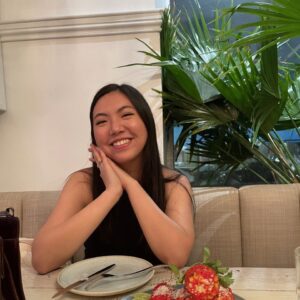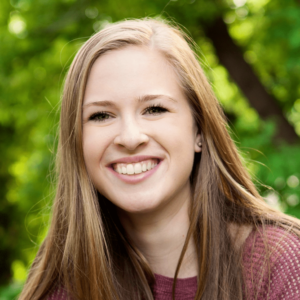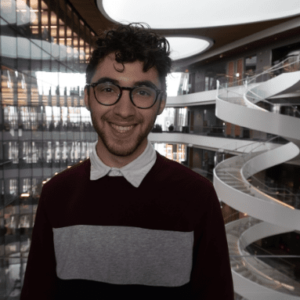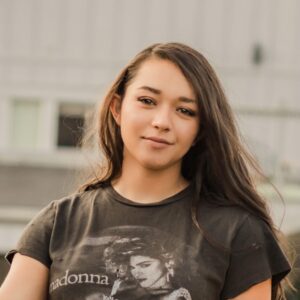Co-op Student Spotlights
A Philosophy, PPE, or Religious Studies major can prepare you for a wide range of professional experiences. See below for a look at where your degree can take you!
Spring 2022 Co-Op Interviews
During the Spring 2022 co-op cycle, Katrina Hsu interned as a Policy and Outreach Associate at the Sexual Violence Prevention Association. See below for Katrina’s interview:
Department of Philosophy and Religion: What are some of the things that you are responsible for in your day to day work?
Katrina: I’m responsible for a broad range of policy and outreach projects. I post relevant resources on the SVPA social media, curate a newsletter for members, onboard new members and potential co-ops, gather and summarize policies (such as the Violence against Women Act and Title IX), and summarize research articles (such as the effectiveness of bystander intervention training and perpetrator centric sexual violence prevention).
Since SVPA is such a small startup, I also help research funding opportunities, such as grants, fellowships, and awards.
P&R: What interested you in this co-op?
Katrina: Systemic sexual violence was an incredibly prominent issue at my high school, on the student and even faculty level. I found that sex education and teaching consent is something that is missing, and institutions often neglect the importance of sexual violence prevention.
The SVPA works in helping prevent survivors in the first place, by implementing an SVPA score that incentivizes institutions to do better in their sexual violence prevention, as well as implementing K-12 education so students can receive proper and inclusive sex education.
P&R: What is your favorite part about your co-op?
Katrina: My favorite part of this Co-op is how I can do work that I am interested in. Since I work for a small, non-profit start-up, I don’t have to only do entry-level work. I can work on projects that I genuinely care about, and it has been incredible being able to properly develop my professional skills.
The SVPA is also incredibly non-hierarchical, and my work is valued just as much as my coworkers and even the CEO. Omny, the founder and CEO, fully trusts the judgment of Co-ops and it’s been incredibly interesting being able to interview future Co-ops and hires, as well.
The SVPA is always looking for volunteers! If you have any questions about the SVPA feel free to contact me at katrina@s-v-p-a.org
P&R: Do you have any advice for future co-op students?
Katrina: My advice would be to try and do everything you are interested in! Always ask your boss or supervisor if there’s a project that you may be interested in doing, or a skill you are interested in learning. This will help you explore that career path more fully and allow you to develop both hard and soft skills in the workplace. It also allows for great networking opportunities!
I also recommend that you choose something you are passionate about. It helps you stay way more motivated (especially if you do remote work like me). During interviews, ask any questions you may have to figure out if the job is a good fit for you! It is always a mutual process in deciding whether this position is a good fit.
During the Spring 2022 co-op cycle, Kiersten Luger interned at the Joel Nafuma Refugee Center in Rome, Italy. See below for Kiersten’s interview:
Department of Philosophy and Religion: What are some of the things that you are responsible for in your day to day work?
Katrina: I’m responsible for teaching English lessons to anyone who wants to work on their English, as well as helping with Computer Class: showing the basics of computers to anyone who wants to learn or practice, for example, Microsoft Word, sending an email, etc.
I also handle general administrative tasks, including management of the storage room: including finding any clothes, shoes, hygiene products, blankets, jackets, etc. that the refugees may need and provide them with it.
P&R: What interested you in this co-op?
Kirsten: I loved the global aspect. I wanted to move abroad again and do my best to learn a new language and meet different people from around the world. This co-op has allowed me to do exactly that.
P&R: What has been the most challenging part of your co-op so far, and how did you handle it?
Kiersten: The most challenging thing I have experienced so far is the language barrier. I do not speak Italian, and many of the refugees do not speak English or Italian. I am learning patience from this – to find ways around using a specific word, to point to something – it does not help to get frustrated because you cannot verbally understand each other. I am also learning more Italian, and a few words in other languages as well.
P&R: Did this co-op make you lose or gain interest in a specific career path? Why?
Kiersten: This co-op has further solidified that I love working on a more global scale with people from around the world. I also think in the future I will not shy away from choosing more challenging career options, because this experience has been a big challenge, but one that has paid off. I moved to a country where I do not know anyone and where I do not speak the language, and I have made many new friends and am slowly starting to learn more of the language and culture.
P&R: Do you have any advice for future co-op students?
Katrina: Especially if you want to do a global co-op, start way earlier than you think you should. I had to create my own co-op, because not many global co-ops for a criminal justice and philosophy major exist that I could find, especially during covid, and every step of the way was a challenge, I wish I had started earlier and been able to pace myself better.
During the Spring 2022 co-op cycle, Zach Greenwald worked as a Legislative Intern at US Senator Amy Klobuchar’s office. See below for Zach’s interview:
Department of Philosophy and Religion: What are some of the things that you are responsible for in your day to day work?
Zach: I spend about 60% of my time doing work with constituents, and 40% of my time on legislative duties. Working with constituents includes reading, sorting, and logging mail, emails, voicemails that come into the office of concerned constituents. These messages are often about bills that constituents do or do not support and casework issues constituents may have with the federal government like taxes and immigration situations. I also have two weekly three-hour shifts on our office phones where I directly speak to constituents, answer questions, and direct them to any information they are looking for. My current legislative area is commerce, science, and technology. Legislative duties can look like researching current concerns in these fields that may require legislative action or a statement from the senator, attending and taking notes on briefings, and preparing the senator with background information and questions for hearings.
P&R: What interested you in this co-op?
Zach: In Summer 2021, I worked as a summer intern for the Minnesota Democratic-Farmer-Labor Party. While working there I focused a lot on internal issues within the party and campaign events for candidates across Minnesota. After this experience, I knew I wanted to do my first co-op in something similar, but more focused on what politicians do after they are elected. This led me to apply to intern in Senator Klobuchar’s office as she is arguably the most established Minnesota politician.
P&R: What has been the most challenging part of your co-op so far, and how did you handle that?
Zach: The first two months of my co-op were completely virtual which made it hard to connect with others in the office and feel attached to my work. To try and resolve this, I met with fellow interns outside of work to interact with them and continually asked for projects to work on in the office to meet other staff and understand how they contributed to the work of the senator.
P&R: What is your favorite part about this co-op?
Zach: My favorite part of this co-op so far has been living in Washington DC! I had never been to DC before I moved here, and I have absolutely fallen in love with the area. I’m excited to return to Boston when I am finished with my co-op, but I certainly see myself returning to work in DC in the future.
P&R: Did this co-op make you lose or gain interest in a specific career path? Why?
Zach: This co-op has taught me a lot about employment opportunities and fields within the federal government. Through my work I have been able to interact with people within Congress and the Federal Government. These interactions have allowed me to grow my understanding of what a career in politics looks like, rule out things I am not interested in, and focus on areas I am passionate about.
P&R: Do you have any advice for future co-op students?
Zach: I knew that I wanted to co-op in a congressional office for my first co-op so I applied to a couple of dozen and didn’t land this position until mid-December, 3 weeks before I had to start. It was stressful figuring out the logistics of doing the co-op but because I waited and stuck to what I knew I wanted to do, I have gotten the opportunity to be working in exactly what I’m interested in.
During the Spring 2022 co-op cycle, Sophia Olivieri worked as an Editorial and Communications Intern at the MBTA. See below for Sophia’s interview:
Department of Philosophy and Religion: What are some of the things that you are responsible for in your day-to-day work?
Sophia Olivieri: I work for the Office of Performance Management and Innovation within the MBTA, and my main role is being the managing editor of their Data Blog. I edit posts written by others in the office, think of post ideas, and write some myself as well. These posts feature the work the OPMI does and cover topics like ridership and pandemic impacts on the MBTA using data analysis. I also read over and edit various documents that the office releases to the public.
P&R: What interested you in this co-op?
Sophia: I liked how this co-op was a mix of editorial and government work; it was a good mixture of my interests in English and politics. Being able to convey information about a public good and increase transparency to the public through my job was attractive to me. I also did not know a lot about data work, so I thought this would be a good way to be introduced to it.
P&R: How has your PPE major prepared you for this co-op experience?
Sophia: My job requires looking at topics with different perspectives, and I think my PPE major prepared me for this. The critical thinking and writing I have done so far has allowed me to look at problems from a larger perspective, and I use this in my editing through finding ways to convey information in the most clear and precise ways possible.
P&R: What is your favorite part about this Co-op?
Sophia: My favorite part about this co-op is the opportunity to do different things every day. Along with my editing role, I help out with other projects in the office, like writing posts with others or helping out with research projects. I also like learning so much about an area I was uninformed about previously. Learning about the nuances of public transportation through these posts has kept me interested in the job and has given me insight into this area of governmental work.
P&R: How do you think this experience is informing your career goals?
Sophia: This job has shown me the pros and cons of working for government, which I find valuable. I think if I do end up working in government I will stay in the local/city level.
P&R: Do you have any advice for future co-op students?
Sophia: Even if you think a job does not fit your ideal 100%, you should apply anyway. Doing something different than I necessarily envisioned has worked out really well for me, and it might for you too!
During the Spring 2022 co-op cycle, Sarina Singh did a coop in Talent Acquisition and Global Operations at Goodwin Procter LLP. See below for Sarina’s interview:
Department of Philosophy and Religion: What are some of the things that you are responsible for in your day to day work?
Sarina: I do mostly Interview Coordination (Scheduling and managing interview communications, greeting candidates, and facilitating feedback). I also work with job board postings and with helping to advertise positions to a wider audience. Longer term, our co-op team is focused on projects to improve the co-op on boarding process, improving communications to candidates, and any other HR projects the TA team needs assistance with.
P&R: What interested you in this co-op?
Sarina: I was really interested in working in a law firm environment, and Goodwin is not only a prestigious firm, but also one that’s dedicated to making the legal space more diverse, more inclusive, and also more cutting edge. They are working to enhance all aspects of the employee experience and I knew I would be lucky to get to have those experiences.
P&R: What have you learned so far?
Sarina: I’ve learned a lot about how to work in a team environment. Having a support system in your work place is super important, but supporting others can’t come at the expense of your own performance. Striking that balance between being a supportive team member and being conscious of the workload you have is tough, but it’s important for the success of your team overall.
P&R: How do you think this experience is informing your career goals?
Sarina: It’s helping me understand the hiring process and learn more about the kinds of careers I want from a different perspective. I’m still figuring out what this particular position means for my career path, but I have so much more information now that will help me going forward.
P&R: Do you have any advice for future co-op students?
Sarina: Be patient, and also keep in mind that you shouldn’t take a co-op you don’t want for any reason. Pick a job that seems appealing to you with a team you think you’ll get along with. Also, don’t be afraid to reach out to the former co-ops for the roles you want (myself included) to help you understand the job! We can help you understand a position outside of just the job description.



